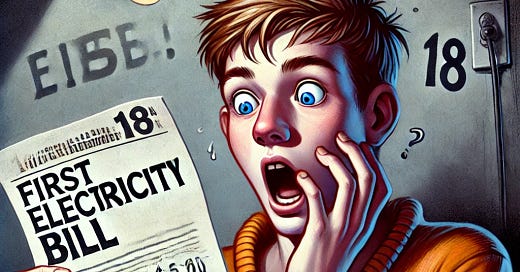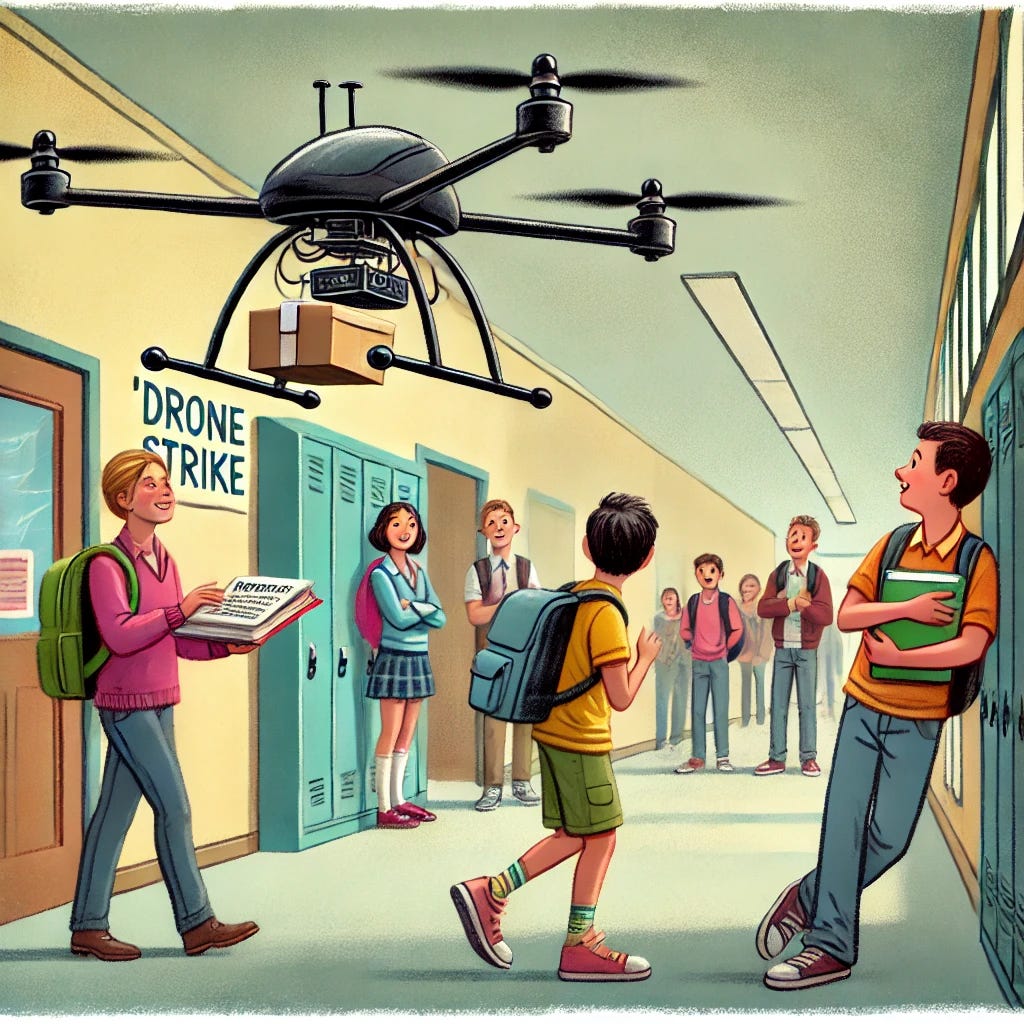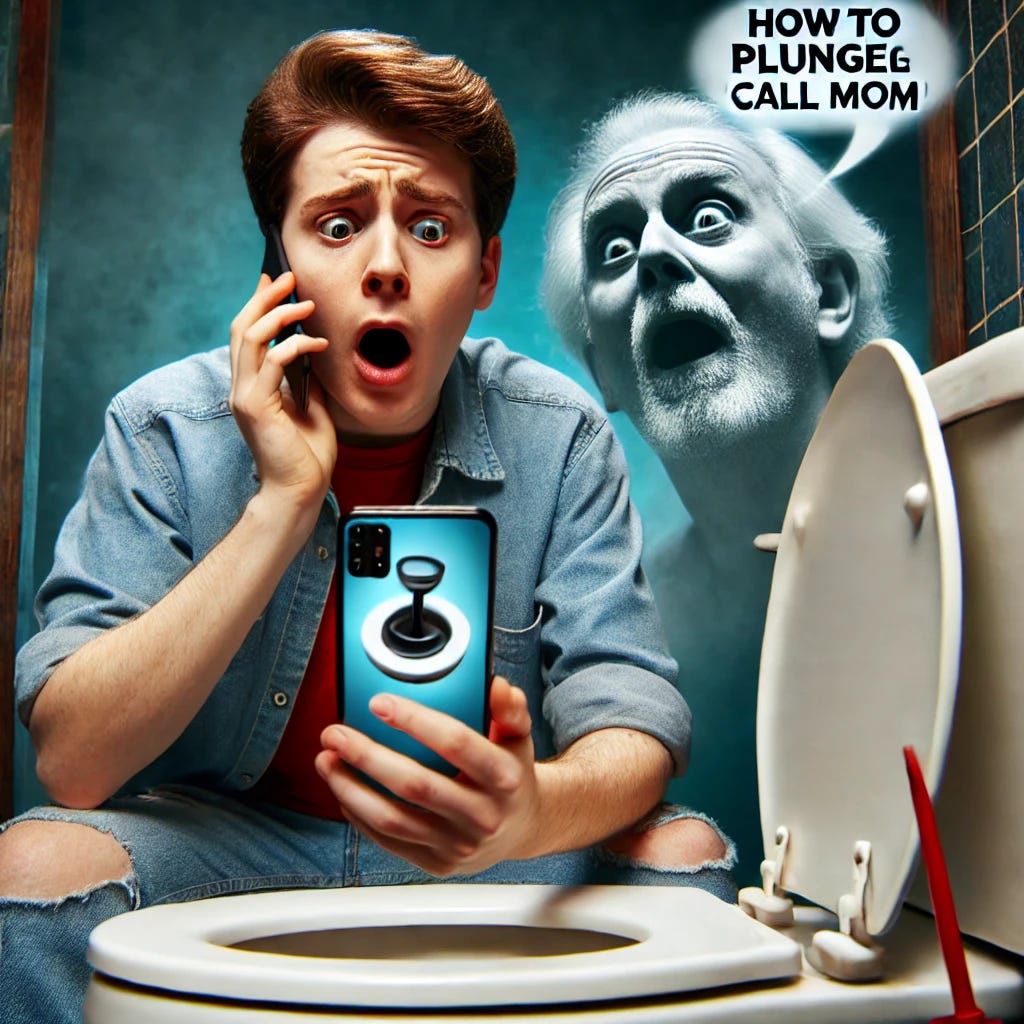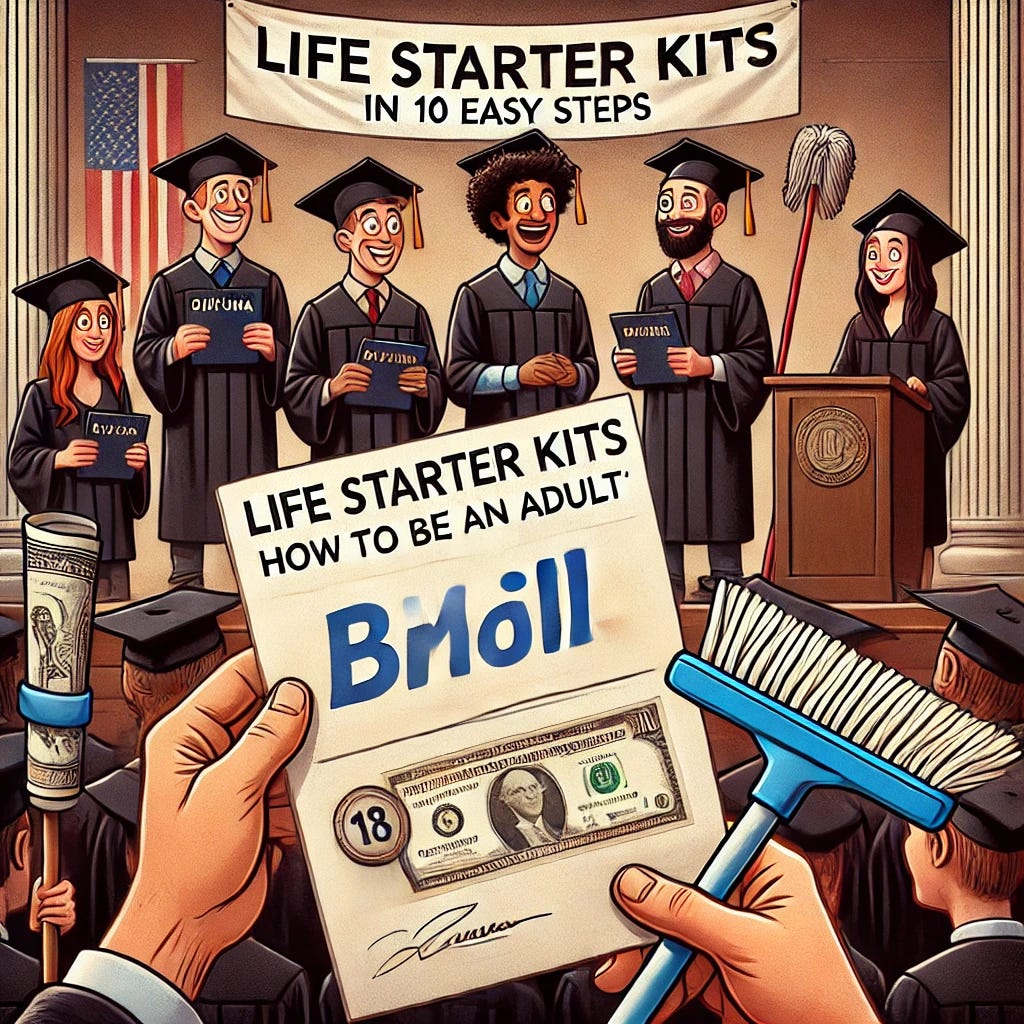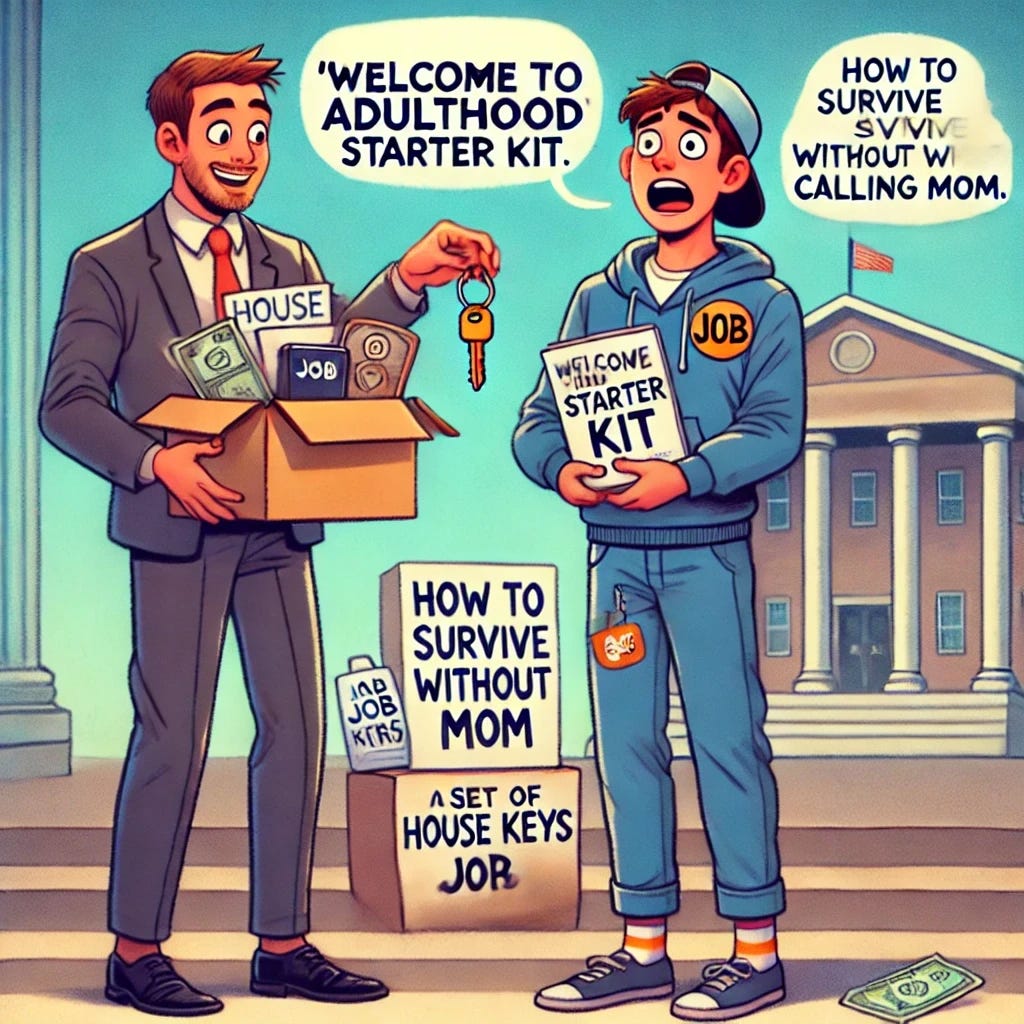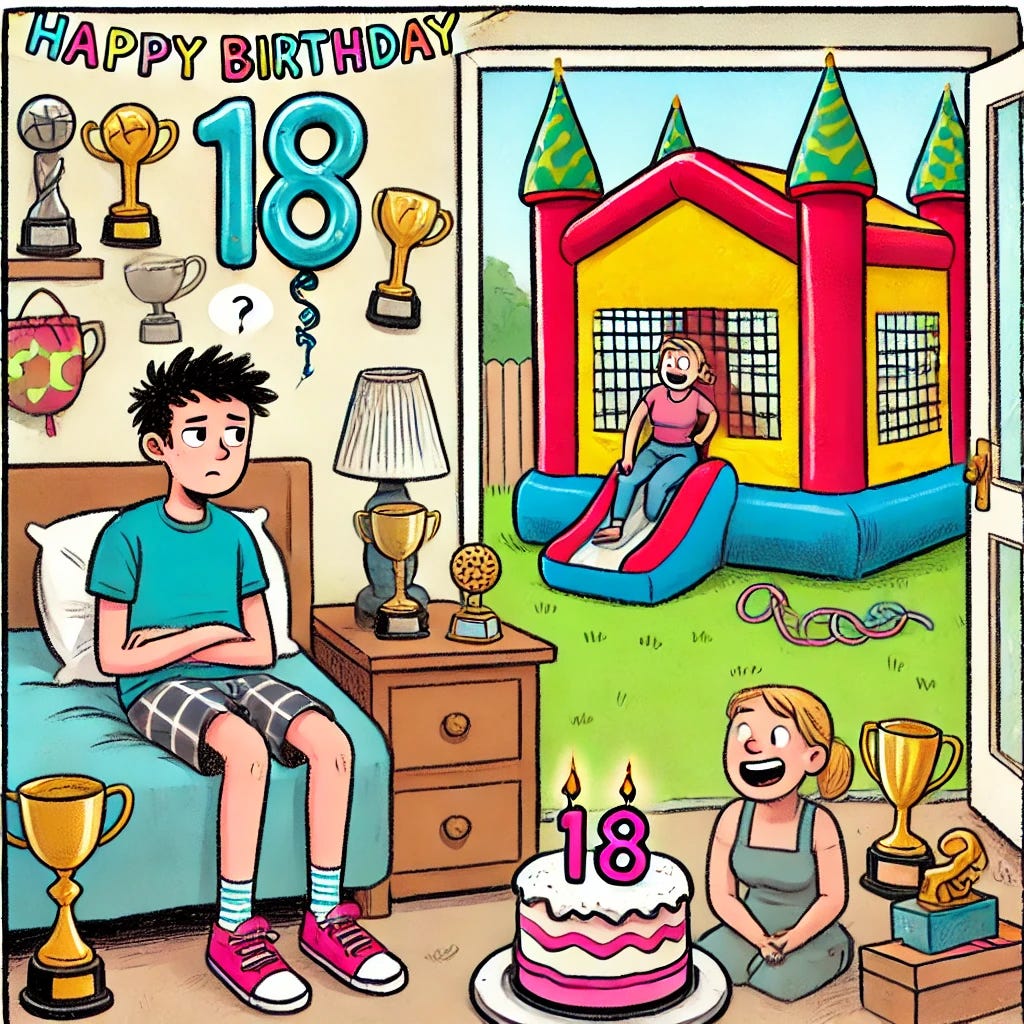I am not a parent myself, but for the past 25 years, I have worked closely with parents and children as a school district and county administrator of education. And let me just say—parenting today is like running an ultra-marathon while juggling flaming torches. Blindfolded. And, instead of cheering from the sidelines, the world is watching through the judgmental lens of social media, ready to roast your every move like a Thanksgiving turkey.
Back in the day, turning 18 meant you were officially an adult. You got a job, maybe joined the military, got married, or at least figured out how to do your own laundry without calling your mom in a panic. Today, 18 feels less like a stepping stone to adulthood and more like an extension of childhood—except with college debt, video game marathons, and an uncanny ability to DoorDash a meal at 2 a.m.
I moved out for the first time at 19—briefly—for a six-month summer stock theater gig in Santa Rosa, California. At the time, I was working as an assistant director for The Star Trek Adventure show at Universal Studios Hollywood, where I met the production manager for the Santa Rosa Repertory Theater. That connection landed me my first professional theater job outside of L.A.
After that, I moved back home with my parents while chipping away at my lower-division undergrad courses at Glendale Community College and Los Angeles Valley College. Then, I hit the road again—this time for nearly four years—traveling across the U.S. and Canada, working in amusement parks and regional fairs, performing, producing, and directing comedic stunt shows. My final stop in that chapter of my life was Chicago, where, one morning, I woke up with an overwhelming urge to return to California, finish my degree, and get on with my life. So, back home I went, this time to complete my upper-division coursework at Cal State Los Angeles.
During grad school at UCLA, I lived with my girlfriend Sarah (RIP) until I finally moved out for good in 1999 when my degree was in hand and my student life was over.
So, while I didn’t officially cut the cord at 18, I wasn’t exactly parked in my childhood bedroom playing video games for a decade either. I lived independently on and off, traveling the country and paying my own way through college. Dorm life might have been an option, but going into debt just to live in a tiny, dingy room a few miles from my parents’ house didn’t seem like the smartest financial move. You see, I paid for my own education—every penny of it. I know that’s an unusual flex, but it’s one I’m pretty proud of.
Now, before we start shaking our fists at modern parents, let’s acknowledge something important: they’re not doing this because they’re weak, clueless, or overindulgent. They’re doing it because the world is a financial and social obstacle course, and they just want their kids to survive. College tuition has skyrocketed, job markets are tougher, and don’t even get me started on rent prices—so it’s not shocking that parents feel the need to keep their kids under their protective wings a little longer.
But in their attempt to make life easier, many parents have taken what used to be helicopter parenting and upgraded it to full-blown drone strike parenting. Kid forgets their homework? No problem, Mom will speed across town like she’s in a Fast & Furious movie to drop it off. Child feeling overwhelmed by a tough decision? Dad is on Google at 3 a.m., researching the top five life paths with the least risk of disappointment. Job interview? Parents are practically sitting next to their kid, whispering answers in their ear like a teleprompter.
The result? We now have a generation of young adults who are absolute geniuses at curating the perfect Instagram aesthetic but have the life skills of a 12-year-old who just woke up from a coma. They can write an entire thesis on climate change but are baffled when asked to plunge a clogged toilet. They can passionately debate economic policies but freeze when faced with the terrifying challenge of making a dentist appointment.
So, what’s the solution? First, parents need to embrace the idea that struggle isn’t the enemy—it’s the training ground for life. You don’t learn to ride a bike if someone is constantly holding onto the back of it. You don’t become financially responsible if your parents are still paying for your gas, your rent, and your avocado toast habit well into your late 20s.
Second, it’s time to start giving kids responsibilities early. If they can master the complexities of Minecraft, they can certainly learn how to separate lights from darks in the laundry. If they can navigate TikTok trends, they can absolutely learn how to budget their weekly allowance. Independence isn’t something that magically appears at 18—it’s built through small, everyday challenges that add up over time.
Third, parents need to switch from being their kids’ personal assistants to being their life coaches. Instead of fixing everything, they should guide their kids through decision-making processes, allowing them to make mistakes and—gasp—learn from them. Being a parent should be less like being a crisis hotline and more like being a really wise, patient Yoda.
Finally, as a society, we need to normalize the fact that being 18 means taking ownership of your own life. Yes, the world is a scary, complicated place. Yes, the economy is a mess. But at some point, young adults need to step up and start participating in life, not just observing it from the comfort of their childhood bedrooms.
Look, modern parents love their kids, and that’s a beautiful thing. But love isn’t about removing every obstacle—it’s about equipping kids with the tools to handle obstacles on their own. Because if we don’t start nudging them toward independence now, we’re looking at a future where 40-year-olds are still calling their mom to ask how to boil water. And I think we can all agree, that’s a level of family bonding that just isn’t necessary., what can be done? First, parents need to accept that their job is not to create a frictionless world for their kids but to prepare them for the unavoidable chaos that is adult life. That means letting them fail. Yes, fail. Failure is an essential ingredient in the "becoming a functioning human being" recipe. It’s right up there with self-doubt, learning to eat cereal with water when you're broke, and experiencing the existential horror of your first electricity bill.
Second, fostering independence should start early. That means not doing everything for them. If your kid is old enough to have an Instagram account, they are old enough to make their own dentist appointment. If they can name every obscure anime character, they can probably learn how to do their own laundry. And if they can craft elaborate TikTok conspiracy theories, they can definitely Google how to cook spaghetti.
Third, parents need to rethink their own identities. Parenthood should not be about engineering the perfect, well-padded life for your child but about ensuring they don’t become the kind of person who calls you at 30 asking what a W-2 is. It’s about raising someone who can exist in the world without needing a daily pep talk and a list of troubleshooting steps.
Finally, society as a whole needs to get back to marking the transition to adulthood with real, tangible milestones. Back in the day, you turned 18, and suddenly the world expected things from you. Now? You turn 18, and your parents rent you a bouncy house. We need a modern equivalent of the "Welcome to Adulthood" ceremony—maybe something involving a small apartment, a part-time job, and a bill that is entirely their responsibility.
Middle-class America has turned parenthood into a high-stakes, overly sentimentalized competition, and we’re all suffering for it. It’s time to retire the bubble wrap, put down the participation trophies, and reintroduce the concept of self-sufficiency. Because if we don’t? We’re looking at a future where 40-year-olds still have their mom filling out their job applications—and honestly, I don’t think any of us want to live in that world.

